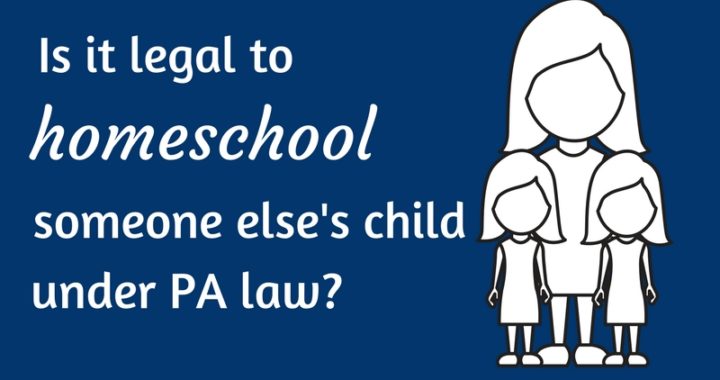A reader asked whether she can homeschool her sister’s children along with her own child (all Kindergarten).
I assumed she is not a certified teacher and that she is not homeschooling her own daughter under the private tutor option which limits instruction to one or more children who are members of a single family. (I’ll discuss that later).
The short answer is “yes”. Nothing in the Pennsylvania homeschool law prevents the reader from including her nieces in her home education program.
Let’s discuss some different scenarios.
1. Students have not reached compulsory attendance age.
In my reader’s situation, none of the children have reached compulsory attendance age (6 years old). Neither she nor her sister have to file anything and can make any arrangements that works for them. There is no official subject requirement, no minimum number of days, no evaluations, testing, etc.
My advice to the reader at this point is to invite her nieces over to play, have fun, sing, dance, go on hikes, read aloud, bake together, paint and draw, have quiet time in the afternoon.
If she wants to introduce a more structured learning plan, I highly recommend “Five In A Row“, a unit study based on excellent children’s books that includes lessons in Language Arts, Social Studies, Science, Math (applied) and Art for each title.
If the girls are interested in learning letters, numbers, writing and reading, by all means, give them access to all of that but don’t freak out about it.
2. When students are compulsory attendance age
My reader should file an affidavit when her own child reaches compulsory attendance age. She’ll list her home address and phone number and the other information required on the affidavit.
The non-instructing parent (and really, is there such a thing?) should file an affidavit for her own children, listing herself (or other custodial parent or guardian) as the supervisor, her own home address and telephone number. The affidavit should be filed with the her own resident school district. The home address is proof of residency, not to be mistaken with where the instruction will take place (which can be anywhere and does not have to be specified in the affidavit).
A supervisor of a home education program has wide discretion to satisfy the time and subject requirements in the law, including having another person (or a variety of people) instruct the student (co-op anyone?). The law does not require the supervisor to instruct the children in the home education program.
The non-instructing parent should prepare a portfolio for each of her children, obtain an evaluation and results of nationally normed standardized tests in grades 3, 5 and 8. (What’s nice in my reader’s situation is that the sisters can administer standardized tests to each other’s kids). The non-instructing parent should file an evaluator’s certification that an appropriate education occurred with her resident school district.
Any person can instruct a student. It doesn’t have to be another homeschool parent or a certified teacher/tutor.
3. Private tutor
Let’s say a PA certified teacher decides to file under the private tutor option for her own child and wants to instruct other students.
Legally, the law prevents her from being designated as a private tutor for children not in her family because she is the private tutor for her own child.
However, she can instruct children from a different family if one of their parents file an affidavit and accept the role and legal responsibility of “supervisor” of the child’s home education program-even if they have no intention of instructing the child. It’s just a legal designation that acknowledges their responsibility that the instructional requirements of the PA homeschool law will be met.
In this scenario, the private tutor should submit written assurance that the instructional requirements were met for her own child with her own district. The non-instructional parent (supervisor) should obtain an evaluation for her own children (in this case, the private tutor could do it if she’s qualified for that level) and submit the certification to her own district that an appropriate education has occurred.
Even when the children reach compulsory attendance age, I would encourage my reader to resist mimicking a typical classroom setting. The PA homeschool law doesn’t require the methods (textbooks and worksheets) or standards imposed in schools.
We get so caught up in whether a person is qualified to teach but forget that even today, many private schools hire instructors who aren’t certified teachers. Many of us or our parents were taught in parochial schools by nuns or brothers, who not only weren’t certified teachers but who weren’t parents. I have never heard anyone complain about the quality of their Catholic school education back in the day even if they complain about other aspects of it.
If you think including other children in your home education program will add value, go for it!
As I indicated above, you do not need to be a certified teacher to provide instruction to children of another family. If you are a certified teacher in Pennsylvania, it makes sense to file as a private tutor for your own children or the children of another family.

